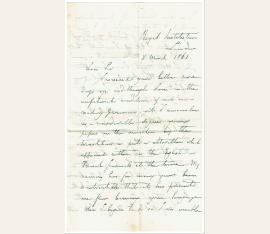Naturforscher (1791-1867). Eigenh. Brief mit U. ("M. Faraday"). London. 8vo. 2 1/2 pp. Doppelblatt.
$ 4,821 / 4.500 €
(83850)
Langer, inhaltsreicher und unveröffentlichter Brief an den Berliner Physiker und Geologen Georg Adolf Erman (1806-77): „[…] I received your letter some days ago, and though I am in the unfortunate condition of not even reading German, yes I remember in a considerable degree your papers in the […] by the […] in part or altogether which appeared either in the English or French Journals at the time. My memory has for many years been so intractable that it has prevented me from learning your language when I geban to do so I was unable to […] I instantly lost all I had for the moment acquired - so that though sum have the vollumas of the Annalen which you refer to under my […] I suppose you allude to my experiments & views in respect of regulation or the adhesion of [?] I really have nothing more to say on the matter as yet than what was read to our ‘royal lovely’ [?] and inserted in the Annalen not long ago.
But whenever anything new and real turns up I shall have great pleasure in sending written accounts of it to you. However, I do not expect much for I cannot work as I send to do and…. Look on and see others work. […]“.
Naturforscher und Experimentalphysiker (1791-1867). Eigenh. Brief mit U. ("M. Faraday"). O. O. (18:11 cm). 1 S. auf 1 Bl.
$ 1,607 / 1.500 €
(91408/BN60490)
An Charles (?) Wiener: "Dear Sir, I have only now viewed your note but I hope Mr Arbour [?] has done what he could for you. The Board of Managers heartily agreed to your application". In Brighton hielt sich Michael Faraday wiederholt zur Erholung auf, nachdem er Ende 1839, ermattet von zahlreichen Verpflichtungen, einen schweren gesundheitlichen Zusammenbruch erlitten hatte. - Etwas gebräunt und ein größerer Ausriss am linken Rand (geringf. Buchstabenverlust im Vornamen des Adressaten). Mit schwarzem Trauerrand.


